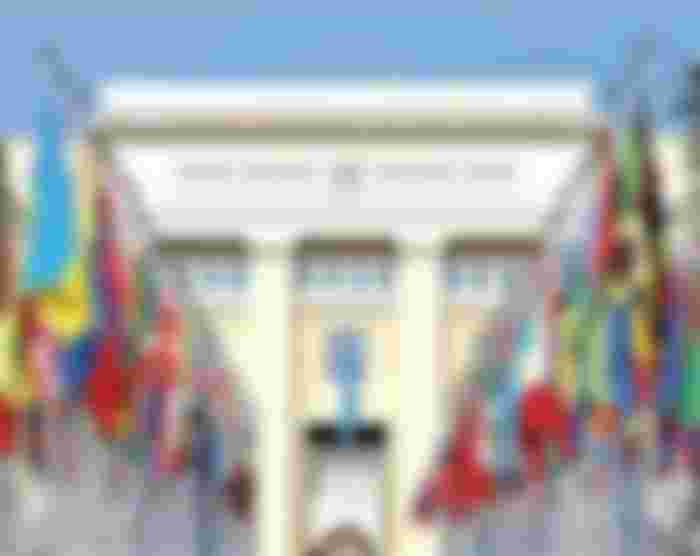At present the number of members of the United Nations is 193. According to the charter of the organization, the membership of the United Nations will be open to all other peace-loving states who will take up all the above-mentioned responsibilities and who are capable and willing to fulfill these responsibilities. The purpose of establishing the United Nations is to increase mutual cooperation for peace, development, human rights and the welfare of all people in the international arena based on the principle of justice.

The United Nations is the largest organization of independent nations in the world today. It is essentially a political inter-state organization, but not a super-state or a world government. On January 10, 1920, the League of Nations was formed with 56 member states to establish international cooperation, peace and security. Although the League of Nations was initially successful, it continued to be influenced by Axis powers such as Germany, Italy, and Japan since the 1930's. As a result, World War II started in 1939. This clearly proves that the League of Nations has failed to achieve its main goal of maintaining world peace. However, despite the failure of the League of Nations, the founders of the United Nations were inspired by its idea. Then the idea of the United Nations was first introduced by the President of the United States Franklin D. Roosevelt. The term United Nations was first used during World War II by the Declaration of the United Nations, issued on January 1, 1945. Where for the first time the representatives of 28 countries declared war on the Axis Powers through a combined force. From 25 April to 26 June 1945, the United Nations Charter was drafted by the representatives of 50 countries at the "Conference of Nations" on the question of international organization in San Francisco. The charter was based on proposals from representatives of China, France, the Soviet Union, the United Kingdom and the United States at the Dumbarton Oaks meeting in Washington in August-October 1944. Representatives of 50 countries participating in the conference ratified and signed the charter on 26 June 1945. Although Poland did not attend the conference, it later became one of the first 51 signatories to sign it. The United Nations was formally established on October 24, 1945, with the ratification of charters by China, France, the Soviet Union, the United Kingdom, the United States, and most of the signatories. Every year on October 24, United Nations Day is celebrated in all independent and sovereign states of the world. According to the decision of the General Assembly, this day was fixed in 1947. At present the number of members of the United Nations is 193. According to the charter of the organization, the membership of the United Nations will be open to all other peace-loving states who will take up all the responsibilities mentioned above and who are capable and willing to fulfill these responsibilities (Article 4 of the charter). The purpose of establishing the United Nations is to enhance mutual cooperation for peace, development, human rights and the welfare of all people in the international arena based on the principle of justice. In times of international crisis, the organization maintains balance by creating interdependence between states to protect national interests. The United Nations is best known for peacekeeping, peacebuilding, crisis prevention and humanitarian aid. But beyond these aspects, the United Nations and its affiliates (various specialized agencies, funds and programs) influence the world in a variety of ways. The organization covers a wide range of issues ranging from sustainable development to environmental and refugee protection, disaster assistance, counter-terrorism, disarmament and non-proliferation, democracy, human rights, governance, socio-economic development and international health, landmines. Works to eliminate, increase food production and meet the goal of building a safer world for present and future generations.

As of October 2017, there are 193 member states of the United Nations. Organizationally, the main organs of the United Nations are the General Assembly, the Security Council, the Economic and Social Council, the Secretariat, the Trusteeship Council and the International Court of Justice. These organizations work to solve the various problems of the member states, increase the benefits, build a better quality of life and provide security. The chief executive of the United Nations is their secretary general. The United Nations has a number of other organizations that are playing an active role in many countries around the world. In addition to the member states, these organizations continue their service activities in other countries. For example, UNESCO is working in 195 countries. The United Nations Trade and Development Organization (UNCTAD) is working in 194 countries, the World Trade Organization (WTO) in 194 countries, the International Telecommunication Union (ITU) in 194 countries, the Food and Agriculture Organization (FAO) in 196 countries and the UPA in 192 countries. ICAO is working in 191 countries, IBRD is working in 16 countries. The United Nations International Monetary Fund (IMF) and the Women in Parliament (WIPO) are playing an active role in 17 countries around the world. ILO is working on workers' rights in 18 countries, MIGA has 160 countries, IFAD has 17 countries, UNIDO has 160 countries, IMO has 161 countries, IAEA has 164 countries. UNCHR, UNICEF, UNIFA are also working outside of this.

As every year, the regular annual session of the UN General Assembly begins in New York on the third Tuesday in September. The Prime Minister of Bangladesh Sheikh Hasina is also present in the 74th session along with more than 100 heads of state and government. The gathering of so many leaders from different countries does not happen anywhere else. The Prime Minister meets at the UN once a year. As a result, the whole world keeps an eye on who said what in this meeting. The first seven days of the session were spent in electing 21 vice-presidents and taking various procedural decisions. The main attraction of the session was the general debate which started from 24th September. It's been two weeks. The day before the debate began, on 23 September, a summit on global climate issues was convened at the invitation of the UN Secretary-General. This time another meeting has been called on the issue of universal healthcare at the invitation of the UN General Assembly. There will be a few more high-level meetings during the general debate. This debate has a lot of diplomatic significance. During the two weeks of the general debate, most of the world leaders spoke with the audience in mind.
Traditionally, the Security Council only deals with military security. It is a body of the United Nations whose resolutions are binding on member states. The Security Council is composed of 15 members. The five superpowers that won World War II Ñ China, France, Russia, the United Kingdom, and the United States were permanent members. These permanent members have the power to veto Security Council resolutions, new member states, or the appointment of a secretary general. The remaining 10 members of the Security Council are temporary. They were elected from certain regions for 2 years. In the first two decades, the Security Council had six temporary members. The work of the Security Council is defined by the UN Charter, which has the power to investigate any situation that threatens international peace, recommend peaceful resolution of disputes, completely or partially sever economic ties as well as sea, air, postal and radio communications. It even has the power to attack militarily.

The goodwill ambassadors are mainly honorable personalities, stars, scientists, writers, dissidents and other high profile social workers. The United Nations appoints goodwill ambassadors to its member countries to implement specific goals, objectives and plans. This is at the stage of mutual agreement or job with the individual. UN peacekeepers, food and agriculture agencies, HIV and AIDS programs, environmental activities, UNDP, UNESCO, UNODC, UNFPA, UN human rights commission, UNICEF, UNIDO, UNIFEM, WFP, WHO, various organizations or organizations are happy to implement their activities. Appoints famous personalities from time to time as ambassadors. Similarly, the UN High Commissioner for Refugees (UNHCR) has given Angelina Jolie the status of a goodwill ambassador as a representative of the organization. They are employed formally or informally as part of the government. The goodwill ambassador demonstrates his or her skills in diplomacy, distributes gifts, distributes goods to the needy, or provides construction materials.
The current Secretary General of the United Nations is Antonio Manuel de Oliveira Guterres. He was the Prime Minister of Portugal from 1995 to 2002. He has been the Secretary General of the United Nations since January 1, 2016. Prior to that, he was the UN High Commissioner for Refugees from June 2005 to December 2015. He has also served as President of the Socialist International. In October 2016, the UN Security Council named him the next Secretary-General of the United Nations. He replaces Ban Ki-moon. The Secretary-General serves as the head of the United Nations. According to Article 96 of the UN Charter, the Secretary-General is referred to as the "Chief Administrative Officer". The charter also states that the Secretary-General may bring to the Security Council a proposal to take "strict action" in the face of any threat to world peace and security. The Secretary-General of the United Nations appoints the Secretary-General of the Security Council in accordance with a unanimous decision. There is no specific policy regarding tenure. But there is already a provision to nominate the Secretary General in the geographical cycle for a period of 5 years in one or two terms. Before Antonio Manuel de Oliveira Guterres, eight others served as Secretary-General of the United Nations. They are- Trigve Lai, Norway; Dag Hammershold, Sweden; U Thant, Myanmar; Kurt Waldheim, Austria; Javier Perez de Queller, Peru; Boutros Boutros Ghali, Egypt; Coffee Annan, Ghana and Ban Ki-moon, South Korea.

Thanks for reading.





Good one